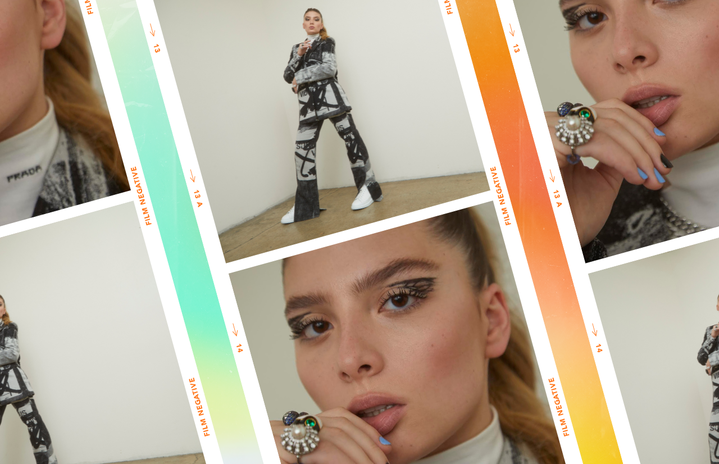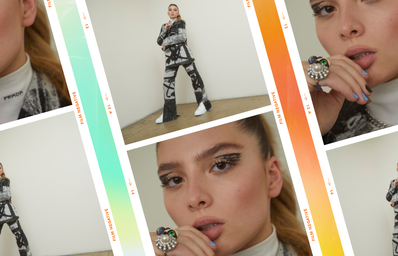Grace Gaustad isn’t your average 20-year-old. Four years ago, they went viral with their cover of Hozier’s song “Take Me To Church,” and the internet catapulted them into fame practically overnight. Now, Gaustad is an independent artist with two albums under their belt, over 600,000 followers combined on both Instagram and TikTok, and music icons like Lady Gaga as their mentor. But Gaustad’s early and meteoric rise to fame has had its challenges, and especially in regards to their mental health.
Gaustad seems well beyond their years — or, at least, that’s what I get from them as we speak over Zoom — and it may be the industry that’s expedited their maturity and wisdom. “Nobody wants to give you any sort of respect [in this industry]. Nobody wants to listen,” Gaustad tells Her Campus. “It’s just point blank hard and you have to learn. I feel like I’ve grown up really quickly because I’ve had to learn how to command an audience and then command a room way before probably the average person would ever have to know how to do that.”
This lesson has spilled over into Gaustad’s music. They’re unconventional, and always pushing the boundaries. Most notably, all of Gaustad’s songs and music videos are gradually released one by one — all several weeks apart, on average — until a cohesive album is formed.
“[The album format we use allows] each song to live and breathe. And a longer rollout allows more people to find the music as it keeps coming out,” Gaustad shares. “Each video and song releases every month and they tell a linear story, which is the same as my first album, [BLKBOX: wht r u hiding?].” Gaustad is currently releasing songs for their second album, PILLBX: whts ur fantasy?, and their most recent song “One Ways” was released on Aug. 26.
“‘Old Ways’ is inspired by wanting to recreate the past, exist in it, [and] stay in it. I think as an artist, I’ve always been fascinated by how the past can affect the future,” Gaustad explains. “‘Old Ways’ fulfills me wanting to go back in time with my knowledge of the future so that I rewrite my outcome. It’s probably one of the most vulnerable tracks on the album because it speaks to a lot of my own insecurities about being afraid to grow, being afraid to change due to the fact that maybe the outside world wouldn’t be able to love and accept the new me.”
Storytelling is at the heart of Gaustad’s music, which is why they follow this album and music video release format — even though it takes a lot more time and effort. “The shoots are very long, both [for] BLKBX and PILLBX. BLKBX was a little shorter; it was about two and a half weeks. PILLBX approached almost a month of shooting,” Gaustad says. “It’s like filming a movie. And it’s hard to write music that not only caters to personal experiences in your life, but also caters to a storyline. It’s kind of like if Broadway and pop music had a baby.”
On the horizon, Gaustad has one singular dream they’ve been yearning for since they were 13 — and that’s to sell out Madison Square Garden. They have a countdown on their phone for it, which will end in four years from now, when Gaustad is 24.
But despite their ambitiousness, Gaustad has faced their own unique set of challenges, struggling with mental health and getting “viciously bullied” in high school. “When I was in high school, I felt so trapped. I felt like it was never going to end,” Gaustad says. “It was so hard to ever imagine a world outside of those high school walls.”
Now that Gaustad has come out on the other side, they realized the world was so much bigger than what they thought it was, and that music was a way to heal from the past. Gaustad’s personal struggles with anxiety, depression, and a learning disability inspired much of their first album. Gaustad felt it wasn’t right to sing songs about their struggles with mental health, though, without providing tangible resources for their listeners, which is why they started BLKBOX Project: a website that provides free and accessible mental health resources for teens and young adults.
“I partnered with a phenomenal therapist. Her name is Jaz Robbins and she put together these 12 totally free, very informative videos based on the 12 topics that the songs were about. She did an incredible job, and the nice thing about it is it’s totally free.” Gaustad continues, “We also partnered with Teen Line, which is a great resource for any teen struggling, who just needs guidance. They’re a wonderful group. [We’ve also partnered with Lady Gaga’s] Born This Way Foundation.”
Like many young adults, Gaustad’s struggles with mental health is still something they’re learning to manage. “I love creating so much that the more I create, the healthier I tend to be,” Gaustad shares. “I’ve allowed music to be medicine for me in many ways. Any time you can express yourself, it’s always going to be good for your mental health, because often I find that poor mental health comes from feeling trapped or not being able to let your emotions out or just not really understanding what’s going on in your brain.”
Gaustad also stresses the importance of being around people who accept them for who they are — whether the relationship with those people is romantic or platonic. “My mental health was bad for a long time due to just surrounding myself with the wrong people, being in the wrong relationships. And I think that has to be something that you figure out on your own that you have to sit back and say, ‘Wow, do I really want the people who are around me, around me? Am I choosing the right friends? Am I choosing the right partner?’ You have to really sit and be honest with yourself about those things,” Gaustad says. “As someone who’s been in a very toxic personal relationship and now in a very healthy one, it can make all the difference in the world to your own wellbeing. And the same goes for friends. It’s no different. Having the right friends is way more important than having a lot of them.”
For Gaustad — and even other young adults like them — prioritizing mental health is a non-linear journey. Gaustad’s advice? “It really does get better. Hang on and know that you will land exactly where you need to be, as long as you stay the course.”


